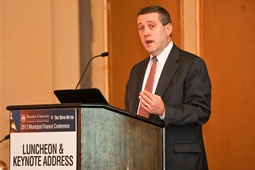IBS conference focuses on municipal markets
In keynote, St. Louis Fed chief says “wait and see” on Fed tapering

James Bullard, President and CEO of the Federal Reserve Bank of St. Louis
Recent events, from Detroit’s bankruptcy to national concerns about pension and retiree obligations, have highlighted the increasingly far-reaching applications of the field of public finance — a fact that became even clearer at last week’s second-annual Municipal Finance Conference, which brought together more than 250 academics and practitioners to discuss issues in municipal markets.
Taking place at the Boston Park Plaza Hotel the first two days of August, the event was co-sponsored by the Bond Buyer, a trade publication, and the Rosenberg Institute of Global Finance at Brandeis International Business School (IBS).
Researchers shared 24 original papers on topics ranging from the economics of centralized markets to the financial impact of political uncertainty. Presenters included professors from Yale, MIT and Brandeis, as well as representatives from Moody’s, the Tax Policy Center, and other organizations.
James Bullard, President and CEO of the Federal Reserve Bank of St. Louis and an influential voice on national monetary policy, delivered the Friday keynote just a few days after the Federal Open Market Committee’s July meeting.
Bullard's speech focused on four key areas — labor market progress, real growth in GDP, inflation and the size of the Fed’s balance sheet — as they apply to the Fed’s recent decision to reduce its quantitative easing, a practice known as “tapering.” He argued that it’s far too early to judge the efficacy of tapering until there’s more information.
“The US looks very good on a global scale right now … it’s an island of stability,” Bullard said. “We’re positioned for good growth, but I want to see the numbers, not the forecast.”
Opening speaker Jim Lebenthal, a founding father of municipal finance, gave a colorful introduction pointing out how the subject infuses all aspects of public life, from financing our highways to bringing clean water to our kitchens.
“Infrastructure isn’t simply ‘spending’,” he said. “It's money that goes back to serving many different needs of the American public.”
The conference was free for students and academics like Rawley Heimer PhD’13, who is starting research at the Federal Reserve Bank of Cleveland this fall. “It’s a great opportunity to enhance each others’ knowledge,” he said. “Practitioners can offer real-world insights that we may never have thought of, while academics can keep muni managers informed on research with direct implications for their companies.”
Conference co-chair Daniel Bergstresser, a professor of finance at Brandeis IBS, first worked on the idea for the event last year with Richard Ryffel, former managing director at Edward Jones and currently an executive director at JP Morgan.
“The goal of this conference is to put professors and professionals in a room together to debate research like this in a rigorous, constructive manner,” Bergstresser said. “It’s a unique sort of cross-fertilization, and we were very pleased with the turnout and the high quality of the discussions.”
Categories: Business





